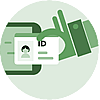Cyber Security:
Online identity theft is a growing threat. It is a type of fraud in which an attacker uses stolen personal information to impersonate another person. Victims of identity theft have had their financial security and lives ruined by identity theft. This type of fraud used to be achieved by an attacker intercepting postal deliveries which contain personal information such as names, addresses, bank account details and so on. Attackers could then open credit card accounts and apply for loans in the victim’s name. The online world has opened up a new, lucrative source of information for fraudsters. Many users have been too relaxed about sharing their information with online services and other users, but even security conscious individuals are threatened by malware designed to sniff out personal information on a computer, or phishing attacks that persuade users to divulge personal information. Also hacking attacks on big retailers can make millions of personal records available for potential abuse.
|
| PRESENTER | In this block of flats behind me, a hacker made tens of thousands of pounds in fraud, and all from the comfort of his own home, until he tried to push his luck a little too far. Ian Wood was using Facebook to fund a lavish lifestyle. |
| DC BILLY JOHNSON | He would generally pose as someone who wasn't himself. For example, maybe as an attractive woman and he would try and befriend men on Facebook who would look at his profile picture and say, 'Oh yeah, I'll be friends with that person'. And what they were essentially doing was allowing this man into their life. |
| PRESENTER | He discovered people often use the same usernames for different accounts online. |
| DC BILLY JOHNSON | What Ian Wood did was he used that username, type it into mainstream banking websites, and as soon as he got the message of username correct, password incorrect - security questions He was in play then, and he could use information from the social networking sites to try and find a way in to that bank account. |
| PRESENTER | Once in, he stole £35,000 from online accounts. He then transferred the money to bogus accounts until he got cocky. |
| DC BILLY JOHNSON | As a lot of criminals do, they get more relaxed about their behaviour, and that was when he made the transfer from a bank account into his own in his name. We went to arrest him for that offence and that was when we opened the door basically to all the activity that he'd been involved in. |
![]()

 ID Theft
ID Theft Preventing identity theft
Preventing identity theft



